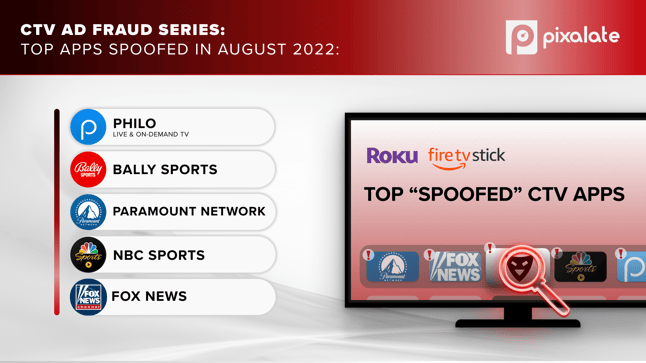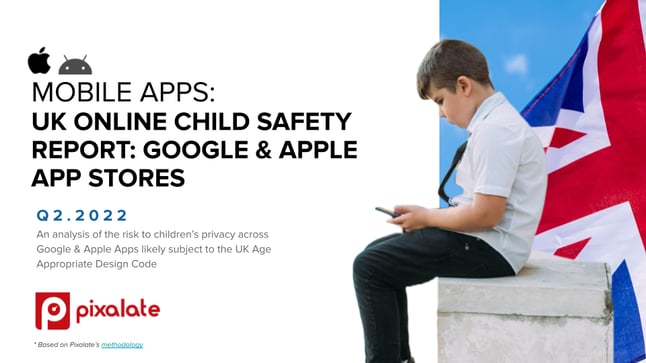
This week's review of ad fraud and privacy in the digital advertising space.
 Pixalate published a blog post outlining our latest update in the CTV Ad Fraud Series – an in-depth look into CTV ad spoofing. The report covers the CTV App Spoofing numbers for August.
Pixalate published a blog post outlining our latest update in the CTV Ad Fraud Series – an in-depth look into CTV ad spoofing. The report covers the CTV App Spoofing numbers for August.
Key takeaways include:

Pixalate released the first-of-its-kind Q2 2022 UK Online Child Safety Report: Google and Apple App Stores, examining the state of children’s privacy through the lens of the UK Children’s Code, finding 800k+ mobile apps across the Google & Apple app stores that are likely accessed by children under the age of 18. 64% of UK-based Children’s Apps in the Apple App Store request permission to access personal info.
Other key findings include:

Digiday interviewed Pixalate’s Senior Vice President for Public Policy, Ads Privacy and COPPA Allison Lefrak about new Federal Trade Commission actions against Kochava and how this case might affect the ad tech industry collectively.
“Allison Lefrak — who spent nearly a decade as an attorney at the FTC focused on privacy and identity protection — noted a part of the FTC’s complaint that suggests Kochava should have created a blacklist for locations related to the types of data addressed in the lawsuit. Now senior vice president of public policy and ads privacy at Pixalate, Lefrak said recent actions suggest the agency is indicating an increased interest in going after the “commercial surveillance” industry.”
“‘If I were an ad-tech data broker, I’d get on this blacklist recommendation,’ Lefrak said.”

POLITICO reports that U.S. House Speaker Nancy Pelosi (D-CA) has expressed issues with the American Data Privacy and Protection Act, which would preempt and possibly weaken privacy laws that California has passed on its own. Pelosi and other members of the California delegation argue that the bill must have caveats to protect state privacy laws already in place. Currently five states - California, Colorado, Connecticut, Utah and Virginia—have passed comprehensive consumer privacy measures.
One of the bill’s co-sponsors Rep. Frank Pallone (D-NJ) argues that the bill will not receive the bipartisan support it needs to pass if exceptions are made for individual states. Pelosi indicated that she will continue to work with Pallone to address the concerns presented by California representatives.
 Ad Age details a lawsuit brought forth by the U,S, Federal Trade Commission against ad tech firm Kochava accusing the firm of selling location data that could be used to determine if an individual visited an abortion care provider and other personal health data. The lawsuit is the first of its kind and is being seen as a test case to whether the FTC will bring forward more “commercial surveillance” cases.
Ad Age details a lawsuit brought forth by the U,S, Federal Trade Commission against ad tech firm Kochava accusing the firm of selling location data that could be used to determine if an individual visited an abortion care provider and other personal health data. The lawsuit is the first of its kind and is being seen as a test case to whether the FTC will bring forward more “commercial surveillance” cases.
With the FTC taking a more aggressive approach to the sale of consumer information recently and conversations about privacy practices across the industry are taking the stage in both state and federal government chambers, the ad tech industry is being put on notice.
*By entering your email address and clicking Subscribe, you are agreeing to our Terms of Use and Privacy Policy.
These Stories on Weekly Recaps
*By entering your email address and clicking Subscribe, you are agreeing to our Terms of Use and Privacy Policy.

Disclaimer: The content of this page reflects Pixalate’s opinions with respect to the factors that Pixalate believes can be useful to the digital media industry. Any proprietary data shared is grounded in Pixalate’s proprietary technology and analytics, which Pixalate is continuously evaluating and updating. Any references to outside sources should not be construed as endorsements. Pixalate’s opinions are just that - opinion, not facts or guarantees.
Per the MRC, “'Fraud' is not intended to represent fraud as defined in various laws, statutes and ordinances or as conventionally used in U.S. Court or other legal proceedings, but rather a custom definition strictly for advertising measurement purposes. Also per the MRC, “‘Invalid Traffic’ is defined generally as traffic that does not meet certain ad serving quality or completeness criteria, or otherwise does not represent legitimate ad traffic that should be included in measurement counts. Among the reasons why ad traffic may be deemed invalid is it is a result of non-human traffic (spiders, bots, etc.), or activity designed to produce fraudulent traffic.”

